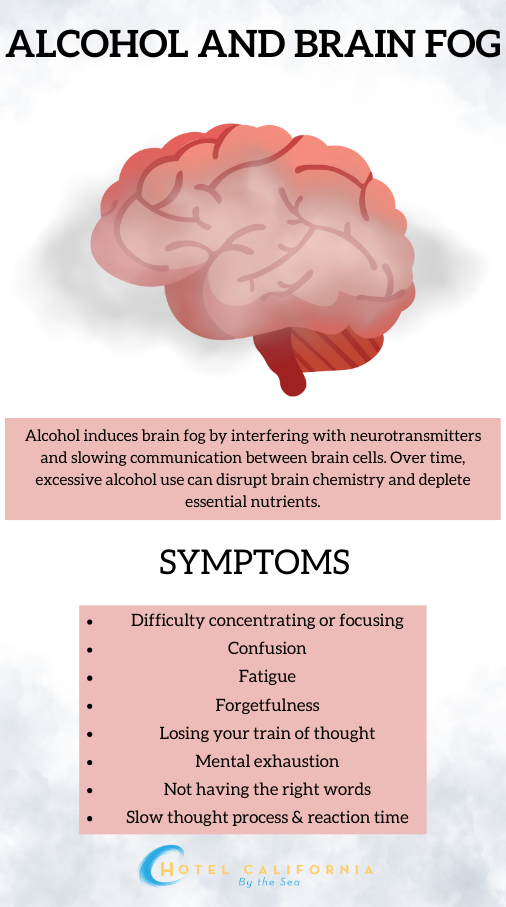The Relationship between Alcohol and Brain Fog
Alcohol is a central nervous system depressant and can impact brain functions including the ability to communicate with the rest of the body. When alcohol depresses and slows down brain functions, this can also lead to a decrease in cognitive functions leading to a common alcohol-induced phenomenon called brain fog. Alcohol-induced brain fog is a common symptom of excessive alcohol use, especially in those who have alcohol use disorder. Brain fog is defined by a struggle with confused thoughts, unreliable memory and overall mental lethargy. Brain fog can also be described as having a cognitive haze. This type of brain fog is common with alcohol consumption and can gradually improve with alcohol cessation.

Research on alcohol abuse shows that alcohol can significantly impact the production of certain types of neurotransmitters in the brain that contribute to the development of brain fog and cognitive function. When alcohol is consumed, it enters the blood-brain barrier and can directly affect various neurotransmitters. The person’s cognitive processes are slowed down and they struggle to have clear thoughts. Brain fog can occur in the days after alcohol consumption. Brain fog can also occur during the phase of alcohol withdrawal.
Effects of Alcohol
Alcohol produces the sensation of pleasure and impacts the brain’s reward system. Alcohol works by increasing brain activity related to the rewards processing system. Alcohol is also a habit-forming substance that can make it difficult to stop drinking. When drinking behaviors are repeated and constantly rewarded, the brain changes control of the sequence of actions involved in drinking. This encourages a person to drink more in order to experience pleasure.
There are a few stages of alcohol intoxication. Subliminal intoxication is when blood alcohol content is between 0.01 to 0.05. This is usually the first stage of alcohol intoxication where the person will experience a slight change in reaction time, behavior and judgment.
Euphoria is described as the early stages of intoxication where the brain begins to release more dopamine and cognitive reasoning and memory are impaired.
The excitement stage is when a person has a blood alcohol concentration between 0.08 to 0.25, which is considered legal intoxication. The person may experience blurred vision, slurred speech and lack of control.
The confusion stage consists of a blood alcohol concentration of 0.18 to 0.30 where the person may experience disorientation, blackouts and temporary memory loss.
In the stupor stage, there will be concerns about alcohol poisoning. When a person goes into a coma and eventually dies, those are the most dangerous stages of an alcohol addiction.

Factors that impact the relationship between Alcohol and Brain Fog
- Neurotransmitter Imbalance. Our body’s chemicals that transmit signals between nerve cells are constantly moving and working. When alcohol is introduced to the brain, it can reduce the release of excitatory neurotransmitters that affect normal cognitive function.
- Memory Impairment. Alcohol abuse can prevent the brain from forming new memories during a process called memory consolidation. When you experience blackouts or have trouble remembering what happened during your drinking episode, it is due to the effects of excessive alcohol use. With chronic drinking, alcohol can induce long-term memory damage and eventual cognitive decline.
- Thiamine Deficiency. Thiamine, also known as vitamin B, is essential for proper brain functioning. Alcohol abuse can lead to a deficiency in this vitamin, which in turn will hinder essential brain functioning.
- Dehydration. A major factor in alcohol-induced brain fog is dehydration. Alcohol is a diuretic and promotes water loss. Alcohol causes the kidneys to produce more urine to remove toxins from the body, which then takes up a lot of water from the body. Even after one drink, your body can experience diuretic effects. The brain is made up of about 73% water. This water is needed to function properly, so when alcohol is introduced and taking away water from the brain and body, it can cause serious damage. A 2013 study found that dehydration from moderate alcohol consumption had a significant impact on daily cognitive functioning.
Symptoms of Alcohol-Induced Brain Fog
- The feeling of mental fogginess
- Difficulty concentrating
- Mental confusion
- Forgetfulness
- Memory loss
- Difficulty with problem-solving and slowed thinking
- Fatigue and lack of energy
- Slowed reflexes and delayed reactions
- Decrease in creativity and mental flexibility
- Difficulty with spatial awareness
- Increased sensitivity to light and noise
- Slurred speech and difficulty with verbal communication
- Headache and dizziness
- Lack of alertness
- Loss of attention and motivation
Check Your Insurance Coverage for FREE
Find out if your insurance covers addiction treatment in minutes. We accept most insurance!
How long does Alcohol-Induced Brain Fog last?
The duration of alcohol-induced brain fog is very dependent on many different factors. The volume of alcohol intake and frequency of alcohol intake are major indicators of how long brain fog can last. A person’s individual metabolism, genetic predisposition and overall general health can also impact brain fog duration.
The severity of a person’s alcohol use disorder is directly correlated with the presence of brain fog. Alcohol consumption leads to different levels of brain damage that affect memory, mood, sleep patterns and other functions. Brain fog is a very common symptom of alcohol use disorder as well as during recovery in the alcohol withdrawal stage.
The duration and frequency of alcohol intake can contribute to the longer-lasting effects of brain fog. In heavy drinkers, it can take much longer for the brain fog to clear up and will require continued and indefinite alcohol abstinence in order to make a full recovery.
On average, it can take a minimum of around 2 weeks for the brain to start recovering from alcohol-related damage and return to a normal cognitive functional status. For moderate drinkers, brain fog can lift within a day and will go away on its own once alcohol use has stopped. For heavy drinkers, brain fog can last for a long period of time. Users can experience symptoms for several days because it takes their body much longer to recover. In some heavy users, detoxing from alcohol can go beyond a month before they start to see a return to normal cognitive functioning. In extreme cases, alcohol-induced brain fog can linger for up to 6 months or more and will require professional medical attention.
How to treat, manage and improve Alcohol-Induced Brain Fog
- Engage in regular exercise and physical activity
- Drink enough water, maintain a healthy diet and cleanse your body
- Get enough sleep and rest
- Practice stress relief, meditation and mindfulness
- Exercise your brain
- Spend time outside in nature
- Seek out professional treatment
Reach out to Hotel California by the Sea
We specialize in treating addiction and other co-occurring disorders, such as PTSD. Our Admissions specialists are available to walk you through the best options for treating your addiction.
Treatment of Alcohol Use Disorder
Alcohol use disorder can become a very dangerous disease with consequences of brain damage including brain fog. Persistent and heavy drinking can lead to extended periods of brain fog and result in cognitive deficits, decline in mental clarity and decreased ability for normal brain functions. Alcohol-induced brain fog is a very dangerous symptom of alcohol addiction and alcohol withdrawal. Professional behavioral health treatment programs such as Hotel California by the Sea help treat substance use disorders, especially alcohol addiction.
We provide treatment at all levels of care including detox, residential, PHP and IOP. Our program utilizes evidence-proven treatment methods including cognitive behavioral therapy, dialectical behavioral therapy and family therapy. The combination of medication management, individual therapy and group counseling can provide a stable platform for our clients as they continue on their journey to sobriety and recovery.
References:
https://www.anonymoushealth.com/resources/faqs/clearing-the-cloud-how-long-does-alcohol-induced-brain-fog-last
https://masscenterforaddiction.com/brain-fog-drinking-alcohol/
https://www.detoxify.com/blogs/health/5-ways-to-reduce-brain-fog-after-drinking-alcohol
https://providenceproject.org/resource-hub/brain-fog-result-of-alcohol-abuse/
https://unitedrecoveryproject.com/rehab-blog/brain-fog-after-drinking/
https://www.niaaa.nih.gov/health-professionals-communities/core-resource-on-alcohol/neuroscience-brain-addiction-and-recovery
https://www.nm.org/healthbeat/healthy-tips/alcohol-and-the-brain
